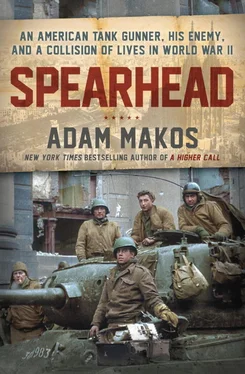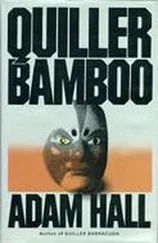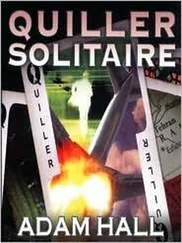Rolf stood in the commander’s position, ribs-deep in the turret, with his hat turned backward so the brim wouldn’t hit his periscopes. The radio antenna waved behind him.
The Panthers were driving toward a gap in the distant forest, where they expected the Americans to arrive. The 5th Armored Division was on the way. A “regular” division with 32 percent fewer tanks than the 3rd Armored, it was now contending for a historic feat.
With Allied units in Italy running up against the Germans’ defensive Gothic Line north of Florence, and the Soviets stalled in Poland along the river Vistula, the 5th Armored found itself in position to reach Germany first, after Spearhead’s unexpected detour to Mons. All that remained was to charge into Luxembourg City and then springboard to the border.
With just twelve Panthers, 2nd Company would try to spoil that feat.
The Panthers had barely traveled a mile when a voice erupted in Gustav’s ears—“Fighter-bombers!” High above Gustav to his two o’clock, a dozen silver planes with red noses were curving around from the right. They were American P-47s, Thunderbolts of the 50th Fighter Group.
Gustav stared in awe as the planes leveled their wings and dove toward him.
Rolf disappeared from above the turret; the driver sank from sight and sealed his hatch. But Gustav wasn’t moving. He held his gaze on the lead plane, captivated. The propeller spun hypnotically. The closer the plane came to him, the wider and wider apart the wings seemed to stretch. Sunlight sparkled from the canopy glass.
“Bubi!” Rolf shouted on the intercom. “Button up!”
Snapped free of his trance, Gustav dropped into his compartment and slammed the hatch cover just before a torrent of bullets sprinted across the tank, leaving a high-pitched ringing noise that reverberated through the hull.
Gustav wanted to slap himself for being so foolish.
The radio squawked with the company commander’s order to disperse. It was every crew for itself. The hull in front of Gustav vibrated as the Maybach engine surged in the rear of the tank. Seven hundred horsepower coursed through the floor.
Outside, the tanks accelerated in the field and fanned out in an effort to put more space between them and become more difficult targets for the planes.
Rolf’s Panther took up the left flank of the formation. Smoke now blasted from its stacks. Its tracks chewed the farm dirt like a coffee grinder before spitting it out the back. The interlacing wheels rose and fell with the terrain, absorbing the bumps, while the cannon stayed level, ready for anything. [4] Although the average American tanker believed that he had the more nimble tank, the Panther was deemed faster and more maneuverable, both on- and off-road, in a U.S. Army wartime test.
At 18 miles per hour the tank hit its stride. But the American planes were hot on their trail. Over the deafening throb of the engine, Gustav heard a clinking and clanging above him, then the thunderous roar of a P-47 ripping overhead. Gustav made himself small and held on for dear life. The tank was barreling along like a runaway train.
The P-47s made pass after pass, mercilessly targeting the vulnerable air intakes over the Panther’s engine. But without bombs or rockets underwing, those grates were too small for the Americans to land a deadly blow. The planes abandoned the hunt and departed, off into the horizon.
Gustav could breathe again, but he couldn’t relax for too long. A new order came on the radio: take cover. Rolf ordered the driver to move the Panther toward a thick grove of woods on their left. Gustav opened his hatch and stood to help the driver steer. Even in the midst of combat, his job was to stick his head out and watch for threats from the side.
Bathed in the sharp shadows of spruce trees at the end of the forest, the Panther halted with a sigh. Rolf had chosen this position for its proximity to a potential escape route, a shady cut in the neighboring woods. The frontal armor faced westward toward the gap.
With the Panther in position, its hatch covers were flung open. After being enclosed in the tight space during the race for their lives, everyone rose hungry for air.
Gustav was surprised to find they had traversed the farthest distance of anyone in their company. Across a field to the right lay a road that led to the gap. Everyone else was on the other side. Just the turret of a Panther tucked beside the road was visible. Two other tanks had slipped among the trees of a hilltop estate. None of the tanks moved as they waited in ambush.

After taking fire from the planes, Gustav’s once pristine tank was scarred. Bullets had raked the turret numbers, stripped the Zimmerit, and blasted away the tow cable.
Rolf lowered himself to the hull, directly between Gustav and the driver. “I need your mirror, Bubi,” he said. “Mine caught bullets.”
Gustav removed the mirror from his periscope and gave it to Rolf. It was more important that the commander could see outside than that he could.
Rolf was an enigma. He received letters from Dresden but never spoke of his family. He wore the silver Panzer badge for surviving twenty-five tank engagements, but never told stories. All Gustav could deduce with any certainty was that he had held a white-collar job before the war, because he spoke fluent English and sometimes sang to himself in English.
—
The Panther’s engine labored as the massive tank idled. An hour, maybe two, passed. Gustav had lost track of time and didn’t own a watch.
Farmers waded into the fields among the tanks, men and women pushing wheelbarrows and digging for potatoes. Life went on. Gustav envied the men and women with their boots caked in soil. He had always loved farm work. The vision before him brought back fond memories of harvesting rye with a scythe in fields similar to these, which his family sometimes did by the light of the moon.
Gustav was a reluctant fighter. Hitler Youth membership had been mandatory since 1939; he’d had no choice but to join. Although he enjoyed the camping, marching, and sports, he’d never wanted to be a soldier like the other boys. Gustav’s dream was to be a locomotive conductor.
Every Sunday, after church, he’d pedal his bicycle far from home to watch the trains chug past on the Hamburg–Bremen line. After the war began, he’d even applied to work in a factory that built locomotives. He hoped it would be a first step toward becoming a conductor.
But when his father was drafted into the army, the family found itself shorthanded and Gustav’s grandmother asked him to remain on the farm. What could have been a difficult choice for some was easy for him. To Gustav, his duty came first, before any personal wishes or desires. He had a duty to his family. To the farm. It was that simple.
When Gustav’s own army orders arrived in autumn 1943, he wrote to the War Office and secured a four-week reprieve to help with the harvest. Only after fulfilling his duty to his family did he board a train to serve his country.
When Gustav finally stood before an army doctor for his physical, the doctor took one look at his compact frame, a perfect fit for tight spaces, and sent him straight to the armored forces.
—
Gustav’s headset crackled with voices. The transmission was scratchy but alarming.
The voices were American. Gustav alerted Rolf—if he was picking up the enemy’s transmissions, they had to be close. Possibly close enough to shoot.
Except for Rolf, who stood lookout with field glasses, the crew withdrew inside and buttoned their hatches.
Читать дальше










![Adam Turvi - Возвращение [СИ]](/books/422738/adam-turvi-vozvrachenie-si-thumb.webp)


